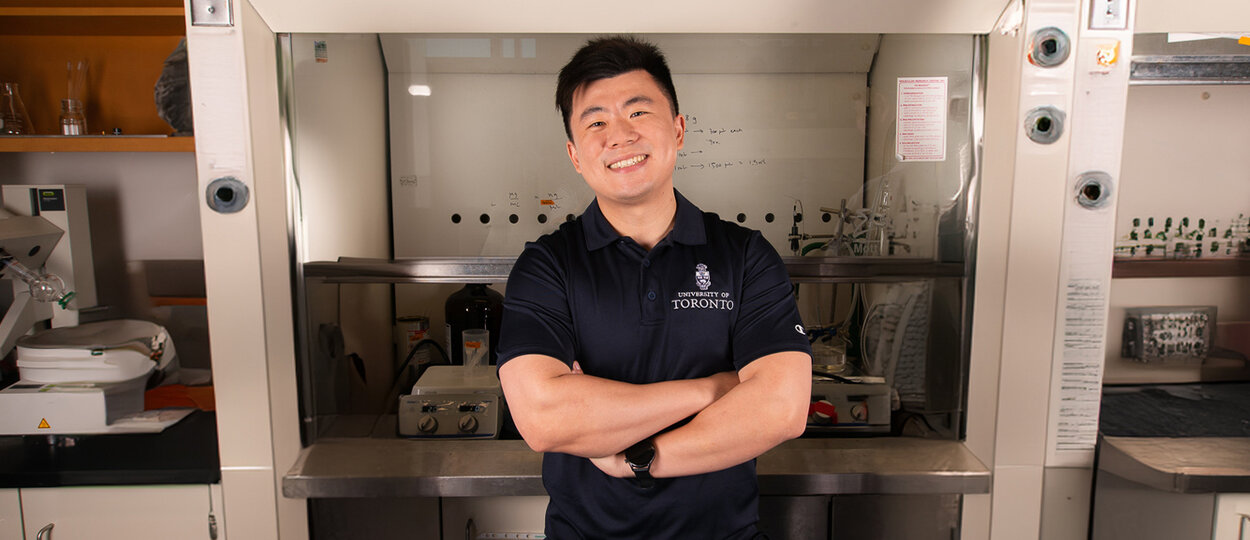Researchers at the U of T’s Leslie Dan Faculty of Pharmacy have developed a first-of-its-kind system that uses artificial intelligence (AI) and combinatorial chemistry to predict the most effective lipid nanoparticles (LNPs) to deliver mRNA to different tissues. The platform, dubbed AGILE (AI-Guided Ionizable Lipid Engineering), can reduce the time to identify and test LNP candidates from months or years to just weeks.
The research was led by Bowen Li, assistant professor at U of T’s Leslie Dan Faculty of Pharmacy, and published in Nature Communications.
“Using AGILE, lipid nanoparticle discovery is no longer by trial and error. It makes our screening process more rational.”
“Using our existing data, we were able to train the computer model and have it learn how to predict the performance of new nanoparticles. Based on the prediction, we could synthesize and test the top candidates,” said Li. “Using AGILE, lipid nanoparticle discovery is no longer by trial and error. It makes our screening process more rational.”
AGILE platform uses AI to predict top LNP candidates
LNPs are essential in mRNA-based therapies, including the mRNA vaccines used for COVID-19. While mRNA therapies have the potential to be used for a variety of conditions, including cancer and some genetic diseases, the LNPs currently available can only deliver mRNA to a limited group of cells.
However, finding new LNPs that are effective in various cell types is both time-consuming and expensive. Synthesizing and testing candidate LNPs to identify the best ones can take months or years, even with high-throughput technology to speed up testing. Using AI, AGILE predicts the LNPs most likely to be effective, allowing researchers to focus on only testing the top candidates in cell lines.
In the new research, co-led by Bo Wang, chief AI scientist at University Health Network, the team trained the AGILE platform with millions of data points on molecular structures, as well as specific data about LNPs. AGILE then screened large libraries of LNPs to predict the best candidates to deliver mRNA to various cells.
In one test, AGILE screened a library of 12,000 LNPs and identified 15 top candidates for intramuscular injection. When the research team synthesized and tested the top candidates in models, one candidate performed as well as a LNP currently approved by the U.S. Food and Drug Administration.
AGILE allows customization of LNPs for different purposes
Li says training the AGILE platform with new data from specific cell lines allows the model to recognize and predict which LNP structures are optimal for different cell types, highlighting its potential to tailor LNPs for different cells and conditions.
Li and Wang plan to launch a start-up to commercialize the AGILE platform to bring new mRNA therapies for a range of conditions to patients.
“AGILE’s adaptability to different cell types allows for the swift customization of LNPs for specific diseases,” said Li. “This enhances the effectiveness of mRNA therapies in diverse biomedical applications and addresses the complex needs of mRNA delivery in clinical practice, thereby broadening the scope and efficacy of mRNA therapies.”
More News
Image

Work experience in research and policy leads new PhD student to pursue translational research
Sai-Amrit Maharaj’s goal to improve lives ultimately led him to Sara Guilcher’s Optimizing Health and Healthcare Experiences (OPTI-Hex) lab.
Read More
Image

The First Domino Falls: AMT-130 Gene Therapy Slows Huntington’s in Landmark Trial
In an update from uniQure, they report that their experimental gene therapy, AMT-130, has the potential to slow Huntington’s disease progression in key clinical study.
Read More
Image

Pharmacists can embed sustainability in patient care
Pharmacists are helping cut health care’s carbon footprint while supporting patients and communities.
Read More
